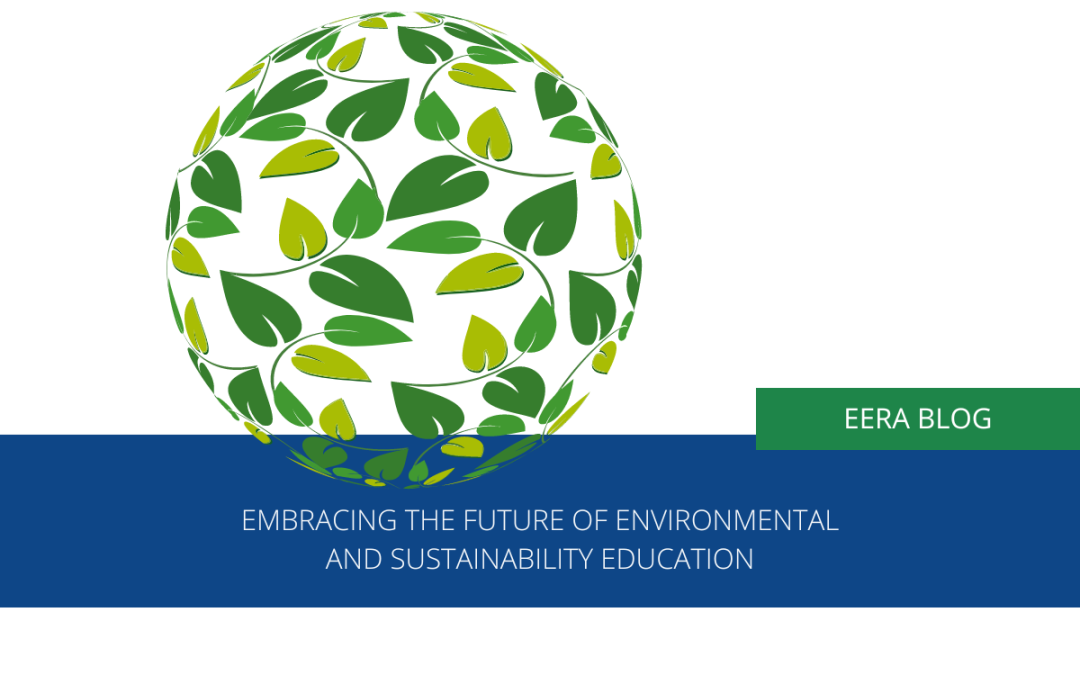At ECER 2023 in Glasgow Network 30, the Environmental and Sustainability Education Research (ESER) network celebrated its 10th anniversary.
Our network was initiated in 2013 in Istanbul, where we ran the first full programme of contributions from members across Europe and beyond. This means that 2023 was the 10th anniversary of our network, and it presented a seminal moment to reflect on where we started and where we are going with research into education’s role in this critical and urgent challenge of the 21st Century.
As part of this stock-taking, we convened two groups to address the whole network at key points during the conference. Our overarching goal for the linked events that we convened is to develop the network in respect of its geopolitical and generational diversity and representation to ensure that the research in our network remains relevant and world leading.
The first group was a panel of established researchers who have been participating in ESER for the last decade. They talked from their own perspectives, both within and outside of Europe, on critical ESE research topics and approaches. The second was a group of emerging researchers who we encouraged to take a creative approach to inspiring thinking about the future of the field. We are using the material from those events to write two linked blogs about ESE research in and beyond Europe.
As an aside, it is worth noting that at ECER 2023 there was also a MOOT in the form of a panel discussion organized by EERA’s journal (European Education Research Journal) that focused on Education in the Anthropocene: ‘Is it Time for Green Education in Europe?’. This event, which was not arranged as part of our network, is indicative of the way that ESER’s field of study has taken root across the range of topics that we in ESER have focused on for the past decade through the network, and for many years before that in different contexts.
In this blog we will focus on the emerging researcher inputs, in the next instalment we will focus on the input from the established academics’ panel.
The event for emerging researchers took the form of 30 minutes of ignite talks (5 minutes each), followed by 30 minutes of open discussions. Each talk was inspired by a material or creative object. Here we draw across the five submissions to elucidate the themes that these up-and-coming researchers indicated as important for the future of our field.
Saskia Weijzen,Wageningen Universit, Netherlands
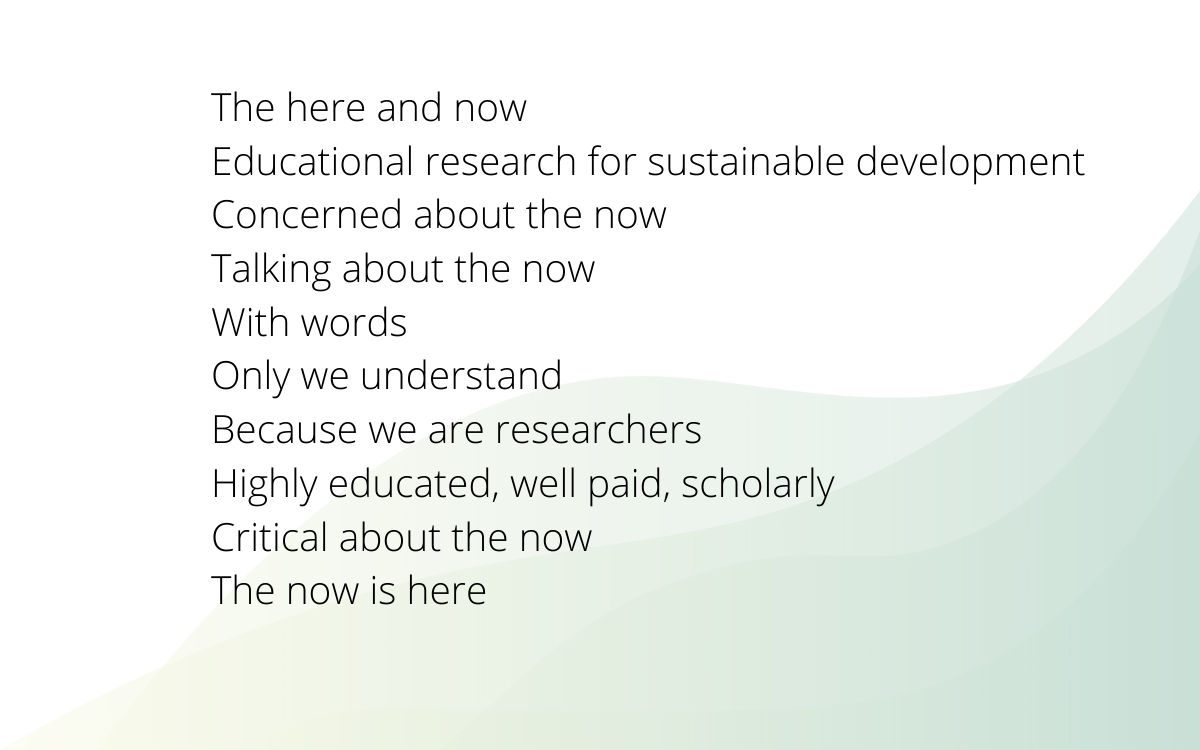
With this poem, Saskia seeks to illuminate the importance of communicating our message beyond the boundaries of our network, and the boundaries of academia itself. She talks about how significant our work is NOW, but that our message is lost because of the way we use language and discourse that is not widely accessible. So, the significance of our criticality is lost to the wider world about which we talk. Despite us being critical of the system in which we are embedded, our very existence as researchers is a symptom of that system. She implores us to break from convention.
Annelie Ott, Oslo Metropolitan University, Norway

Saskia’s perspective was built on by Annelie Ott from Oslo Metropolitan University, Norway, in her quite stark and somewhat jarring presentation that incorporated the use of placards on brown cardboard that we have all become very familiar with as they have been used in so many recent protest movements, including youth green protest movements.
Annelie asks us “How can anarchism be relevant for environmental and sustainability education?” This is a somewhat arresting question to ask, especially in the context of broader political and educational policies, and it leads us to reflect further on our embeddedness within such a system.
Sarah Sharp, University of Cambridge, UK

Two emerging researchers, Rosalie Gwen Mathie from the Norwegian University of Life Sciences, Norway and Sarah Sharp from the University of Cambridge, UK, both with artistic backgrounds, delved into the importance of art and creativity in the field of Environmental and Sustainability Education Research.
Sarah focused on a mindset shift from reductionist learning to relational learning in Environmental and Sustainability Education, and asked the question, “How do we do relational learning in accessible educational spaces – i.e. schools?” and “For us as researchers, what are the relational methodologies needed to create a relational pedagogy?” She used the smoothie as a metaphor for explaining interconnectedness and learning in schools in her presentation. The smoothie symbolizes a complex mixture of different ingredients that cannot be separated and she emphasized that the learning process is like a smoothie, individual elements come together to create a blended experience.
Rosalie Gwen, Norwegian University of Life Sciences, Norway
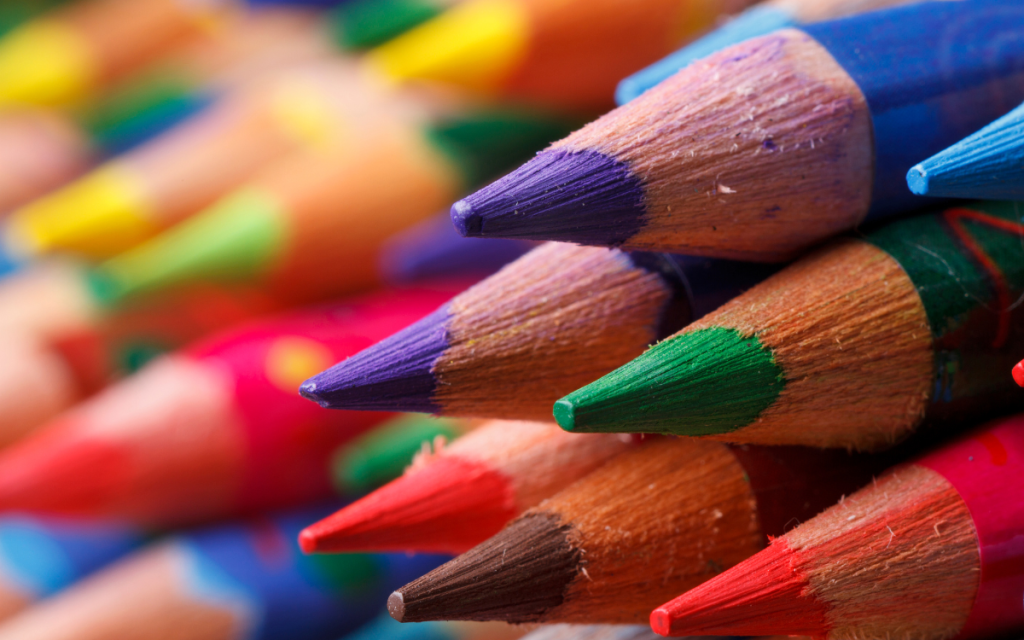
Rosalie, in her talk, also highlighted the division in our way of learning and research methodology; specifically, she emphasized the disconnection between art and science. She noted that we need more time and space to foster creativity and collaboration within education, not only for students but also for adults. She brought some art materials (colorful pens) in her presentation to get researchers thinking about what individuals learn to recognize as art and what this might do for their creativity, and thus their capacity to problem-solving in the future. Overall, she highlighted the necessity of providing more time and space for nurturing creativity and collaboration in our educational settings.
Maria Kondratjuk, Dresden University of Technology, Germany

Lastly, Maria Kondratjuk from Dresden University of Technology, Germany, built her talk on her impressions from indigenous culture. She gave an example from a philosophical perspective called Ubuntu which comes from southern African societal traditions. This perspective focused on the one’s connectedness to the whole in the world.
As Maria noted, “I am part of a family, a group, a community, a peer-group, a region, a city, a country, a culture, a nation, the world”. Maria’s talk pointed out the need to find a balance between human beings and nature in order to create a sustainable life. For this purpose, she emphasized that individuals need to act responsibly to contribute to well-being and sustainability of the whole system.
Summary – and a call to action
These five emerging researchers from our network have highlighted the importance of crossing the boundaries in academia and in society, interconnectedness in the learning process, creativity and cooperation in environmental and sustainability education and living meaningfully and becoming with nature for a sustainable world.
We would like to thank all the presenters for sharing their valuable thoughts and insights, which have provided inspiration for the future direction of the environmental and sustainability education field.
We hope that readers can carry these insights into their own areas.
Key Messages
-
It is important that we are critical researchers and ensure our research findings are communicated beyond academia
-
We must question conventional perspectives and advocate alternative and marginalized principles in environmental and sustainability education.
- We need a relational pedagogy in order to develop interconnected approaches in Environmental and Sustainability Education.
-
We need to foster creativity and collaboration across learning, teaching and research environments.
-
It is critical that we rediscover our (human) place within nature for the wellbeing of all forms of life on Earth
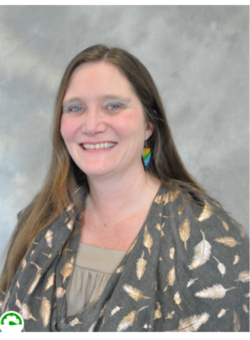
Dr. Elsa Lee
Senior Lecturer, Anglia Ruskin University, UK
Dr Lee’s work focuses on the intersection of education, environmental justice, arts and curriculum. She has led externally funded research projects investigating these issues, and this informs her teaching on undergraduate Education degrees and her doctoral supervision. Dr Lee convenes the Environmental Sustainability Education Research network and is an executive editor of the National Association of Environmental Education (NAEE) journal. She also convenes the Education and Environmental Justice Reading and Research Collective.
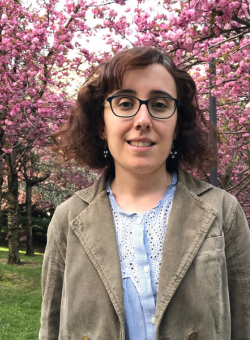
Dr. Güliz Karaarslan Semiz
Associate Professor of Science Education, Ağrı İbrahim Çeçen University, Türkiye
Dr. Güliz Karaarslan-Semiz is an Associate Professor of science education at Ağrı İbrahim Çeçen University, Türkiye. Her research interests are centered around education for sustainable development in teacher education, systems thinking skills, and whole school approach to sustainability. She has a co-convenor role at Network 30, Environmental and Sustainability Education Research (ESER).
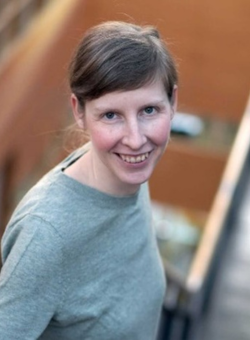
Annelie Ott
Lecturer in Social Studies and Social Studies Education, Oslo Metropolitan University, Norway
Annelie Ott is a Lecturer in Social Studies and Social Studies Education at Oslo Metropolitan University. She initiated the Norwegian research network for environmental and sustainability education, and she is also a convenor of the same network. Currently, Annelie is working on finishing her doctoral thesis where she is looking into theoretical and critical approaches to environmental and sustainability education. She has become especially interested in the semiotics of Charles Sanders Peirce and anarchism.
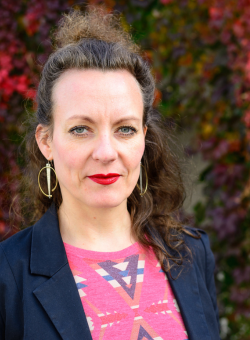
Dr. Maria Kondrajtuk
Professor, Organisational Development in Education, Dresden University of Technology, Germany
Dr. Maria Kondrajtuk holds professorship for Organisational Development in Education at Dresden University of Technology at the Faculty of Educational Science. Her research interests are socio-ecological transformation and education for sustainable development, professionality & professional action in pedagogical fields of action, organisational development in educational systems and decolonising and transforming education.
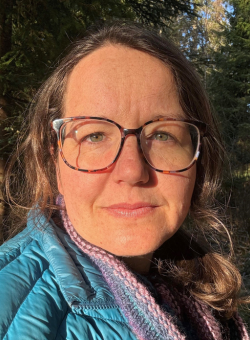
Rosalie Gwen Mathie
PhD candidate, Norwegian University of Life Sciences
Rosalie Gwen Mathie is a PhD candidate at the Norwegian University of Life Sciences working with sustainability-oriented Professional Development. Her main expertise and interests are concerning the role of reflexive and participatory processes in whole institution staff professional development, and co-developing methods to support sustainability-oriented education and institutional transitions.
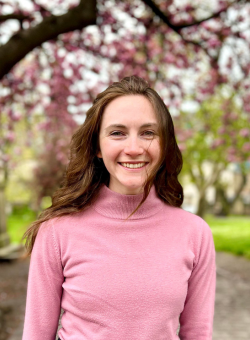
Sarah Sharp
Phd candidate, University of Cambridge, UK
Sarah Sharp is a PhD Candidate at the University of Cambridge. Her research centres around beyond-anthropocentric stories and their pedagogic potential in environmental education. Sarah uses theories of entanglement and relationality to consider approaches to exploring ways we live with the world in school settings.
In addition to previously teaching Drama and Theatre Studies, Sarah is a practicing theatre maker and co-founder of the environmental arts organisation, One Step Theatre. She has supported a range of research in the environmental education field including for the Education and Environmental Justice Research Group and is an Associate Fellow at the Centre for Climate Change and Sustainability Education at UCL.
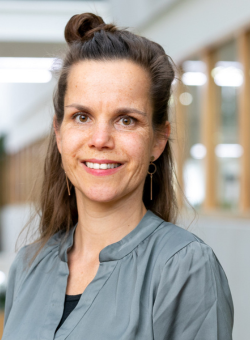
Saskia Weijzen
PhD candidate, Wageningen University, Netherlands
Saskia Weijzen is a pedagogical scientist and PhD candidate at Wageningen University in the Netherlands. Her research focusses on regenerative higher education, and on transcending educational and societal paradigms in this regard. She is an actionable researcher working on transformation as part of her reserach. She invites people within higher education to engage with the arts, nature and spirituality in order to generate knowledge while shaping new relations and new options for higher education to become.

